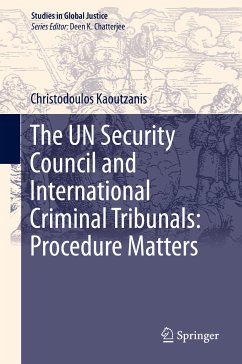
The International Criminal Court as a Means to Realize Universal Human Rights (eBook, PDF)
Sofort per Download lieferbar
Statt: 17,95 €**
13,99 €
inkl. MwSt. und vom Verlag festgesetzt.
**Preis der gedruckten Ausgabe (Broschiertes Buch)
Weitere Ausgaben:

PAYBACK Punkte
0 °P sammeln!
Seminar paper from the year 2015 in the subject Politics - Topic: International Organisations, grade: 1,0, University of Tubingen, language: English, abstract: More than 10 years ago the International Criminal Court entered into force. It was designed to be a model of a global governing of human rights. Trying to set universal standards for the jurisdiction of human rights, it is the first time in human history, that serious human rights violations such as genocide, crimes against humanity, war crimes, and the crime of aggression can be judged in a court of law. The thesis will argue, that the...
Seminar paper from the year 2015 in the subject Politics - Topic: International Organisations, grade: 1,0, University of Tubingen, language: English, abstract: More than 10 years ago the International Criminal Court entered into force. It was designed to be a model of a global governing of human rights. Trying to set universal standards for the jurisdiction of human rights, it is the first time in human history, that serious human rights violations such as genocide, crimes against humanity, war crimes, and the crime of aggression can be judged in a court of law. The thesis will argue, that the ICC therefore presents a milestone on the realization of international human rights. However, the ICC has to face many obstacles, most prominently the opposition by several UN member states, who refuse to accede the Court. The thesis will illuminate this development with the help of some cosmopolitan approaches. The focus will be on the progress of universal human rights over the last centuries with the remarkable climax of the Universal Declaration of Human Rights, which also laid the roots for the later foundation of the ICC. In chapter 3 this thesis will broach the issue of the obstacles regarding the realization of human rights. As mentioned above, a major opposition still stems from the nation states, who are partly still stuck on a realist view of the international system. Out of fear, that they might lose sovereignty, they prefer to follow their national interest instead of putting universal human rights into practice. To explicate this behavior of nation states, I have consulted the article "In the national interest", published by Allen Buchanan in 2005. He reflects on the observation that human rights are in practice in most of all cases incompatible with the national interest of a nation state. Although the majority of all states will commit themselves on paper to the noble goal of human rights promotion, in reality their foreign policy will quite often display quite the opposite. As a reply, I will argue with the help of David Held, that a cosmoplitan answer to overcome these obstacles is possible by creating common institutions as a new layer of legal competence to which people can transfer public powers. To illustrate these considerations I will then discuss the International Criminal Court, as an example of such a cosmopolitan institution.
Dieser Download kann aus rechtlichen Gründen nur mit Rechnungsadresse in A, B, BG, CY, CZ, D, DK, EW, E, FIN, F, GR, HR, H, IRL, I, LT, L, LR, M, NL, PL, P, R, S, SLO, SK ausgeliefert werden.













